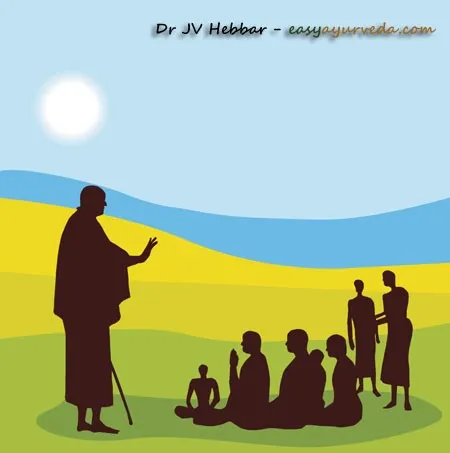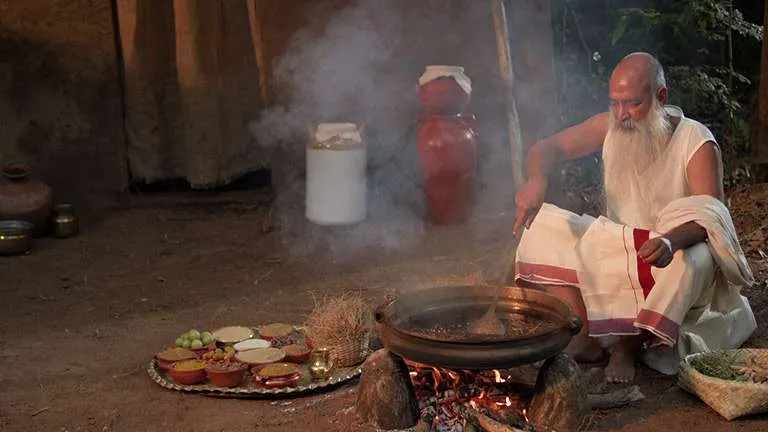All the efforts or activities of human being are in accordance with getting all the comfort or happiness. happiness cannot be achieved without Dharma (Standard principle/ set of virtues). Thus, everyone should follow a dharma.
Sadvrutta has enormous impact on both body and mind.
Kaam (sexual drive), krodha (Anger), Bhaya (fright), Irshya (jealousy), Moha (Desires), lobha (Greediness), harsha (joys), shok (mourning),chinta (worry) ,etc all psychological diseases are resultant of increased Raja and Tama (Two properties of mind) that disturbs the equilibrium of vata, pitta and kapha that ultimately leads to diseases that affects body.
One who follows sadvrutta ,satva (positive property of mind) moreover stabilizes. That keeps body away from Psychosomatic diseases. Thus, sadvrutta palan is very essential.
Sadvrutta includes Avoidance of Paapkarma (Sinful act) as follows
10 types of Paapkarma should be avoided that are caused by Sharir (body), Vani (Speech) , Mann (mind).
Sins avoided by Sharir (Body)-
- Hinsa (Violence)
- Steya (Robbery)
- Anyathakaam (Extra marital affair)
Sins avoided by Vani (Speech) –
- Paishunya (Defaming others)
- Parush (callous talks)
- Anrut (Lying)
- Sabhinna aalaap (Irrelevant talking)
Sins avoided by Mann (Mind) –
- Vyapad (Thinking evil for others)
- Abhidya (Desire to escape others money/wealth)
- Drugg viparyay (Unfaithfulness/ignorance of knowledge)
Following are sadvrutta to be followed –
- Do not harm Insects (spiders, etc) or ants (little creatures).
- Help the jobless. Give sympathy to the miserable.
- Worship God, Cow, old people, King, and guest i.e. Respect them.
- Do not upset, criticise or insult the person asking for help.
- Be grateful even towards your enemy or ungrateful one.
- Be stable in Sampatti (Wealth. i.e. Joys) and Vipatti (loss i.e. Sorrows). Don’t be greedy during or after achieving success.
- Speak Swalp (less), Pathya (useful),Avisavadi (truth), Peshalam (sweet) , Kale (At appropriate time) .
- One should be Purvabhibhashi (firstly who ask for other’s welfare) Sumukh (Cheerful), Susheel (Respecting the adorable),karuna mrudu (Kind and soft spoken) and shouldn’t stay happy alone. One should not believe everyone in every concern. One should not be suspicious about friend, brother and close people.
- Do not introduce yourself as someone’s enemy and vice versa.
Do not showcase the disrespect or admiring behaviour that someone have towards you.
- One should treat others the way they feel content. i.e. By soft talk or Donating. Such a person is known as Paradhaan pandit.(the one who has mastered the skill of give and take)
- Do not refrain your sensory organs from receiving its subjects. Also do not let it overuse its subject.(i.e. Subject of perception of eyes is to see.)
- Do not overgrow your nails, moustache, hairs. Keep your legs and excretory sites clean. Snan daily, Wear simple, clean clothes and ornaments.
- Use Aatpatra (Umbrella), wear shoes and keep eye Hastachatushtay (4 hands. i.e. 4 feet) forward while walking.
- Do not sneeze, laugh or yawn without covering your mouth.
- Do not scrap your nostrils by putting your fingers in. Do not dig the ground with fingers unnecessarily.
- Stop the activities of body, speech and mind before exertion.
- Do not wait below or above tree at nights. Do not wait in nirjan sthan (Place with no people), Chatushpath (square), Suralay (Temple), Smashan (morgue) even during daytime.
- Do not stare at sun, do not carry weight overhead. Minute particles, bright, undelightful things should not be seen for long while.
- If there’s need of stepping out at night, one should carry wooden stick and wear turban.
- Alcohol should not be produced, donated or consumed.



